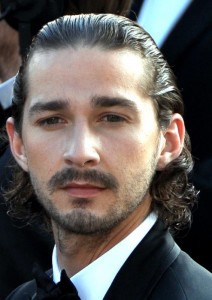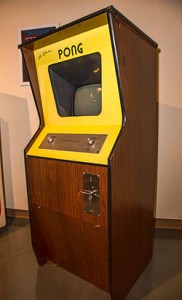
It’s been a rough few weeks for the Even Stevens/Transformers/one episode of Freaks and Geeks actor, Shia LaBeouf. The problem is, every time he opens his mouth (or takes to his keyboard), the words he produces just don’t seem to be his. Here’s what I mean: On December 16, the Shia-directed short film, HowardCantour.com, began its rounds on the Internet. The film, a 12 minute short about a film critic starring comic Jim Gaffigan, had previously been released at the Cannes Film Festival in 2012 and received some praise, but went largely unnoticed by the mainstream. When it hit the web on Short Of The Week on December 16 however, it made a splash...a really, really bad splash. You see, though you may not realize it, people familiar with well-known indie comics who also have all-day internet access can be dangerous to a Hollywood career. LaBeouf found this out the hard way when one such person, BuzzFeed’s Jordan Zakarin, noticed Shia’s film bore a striking resemblance to the 2007 comic Justin M. Damiano by famed cartoonist Daniel Clowes. And by “resemblance,” I mean essentially an exact copy of, with no reference to or mention of the original author. Oops. After getting away with this charade, which included numerous interviews in which he claims his life experiences informed the script, LaBeouf probably thought he was home-free. He clearly underestimated the cultural impact of Buzzfeed.
To thicken the plot, LaBeouf appears to have also plagiarized his tweeted apology. Given his history of straight-up copying, Internet heroes made swift work of fact-checking his mea culpa. They soon discovered that a portion of his apology appeared to be directly lifted from a Yahoo! Answers message board where, four years ago, Yahoo! user “Lili” wrote, “Merely copying isn't particularly creative work, though it's useful as training and practice. Being inspired by someone else's idea to produce something new and different IS creative work, and it may even revolutionize the 'stolen" concept.'” LeBeouf tweeted the following:
Maybe he thought no one would notice? Well, everyone did. Sorry, dude. I’m sure somewhere in Hollywood, Shia LaBeouf is angrily shaking his fist at the sleuths over at BuzzFeed. But he’s certainly not the only celebrity to boldly plagiarize. Sure, artists inspire other artists all the time, but sometimes the inspired are less tactful (or creative) about integrating their inspiration. For instance:

- In 1973, Atari was sued by Magnavox over the game PONG. According to Magnavox, Atari founder, Nolan Bushnell, copied the idea for the riveting game of simulated table tennis from the Odyssey's tennis game. Nolan saw video game pioneer, Ralph H. Baer’s, version at a Magnavox electronics show in Burlingame, CA in 1972 and promptly founded Atari with a fresh, new, game idea. Magnavox noticed the similarity to Baer’s ping-pong simulation game and filed suit in 1973. They reached an out of court settlement in 1976.
- In 2003, the New York Times reported that their reporter, Jayson Blair, “committed frequent acts of journalistic fraud while covering significant news events.” This included falsifying stories, making up quotes and doctoring photos to support his work. He also allegedly lifted details and stories from other newspapers and wire services. When the Times investigated Blair’s work more closely, they discovered fraud in a large number of his published work. Blair resigned in dishonor and the Times spilled the beans on his deception.
- Totally underrated Beatle, George Harrison, let his inspiration get the better of him when he copied the melody to the Chiffon’s 1963 hit, “He’s So Fine”
for his own song, “My Sweet Lord,” released in 1970.
After a long lawsuit, a judge ruled in 1972 that, while guilty of plagiarism, Harrison had done so “subconsciously.”
- American historian and writer Stephen Ambrose is renowned for his biographies of Presidents Eisenhower and Nixon, as well as numerous books on the subject of WWII, including the popular Band of Brothers. However, when his 2001 novel detailing the trials and tribulations of B-24 airmen during the second World War, The Wild Blue, hit bookstores, it wasn’t exactly greeted with open arms. Shortly after the book’s release, Ambrose was accused of plagiarizing numerous passages from University of Pennsylvania professor Thomas Childers’ Wings of Morning: The Story of the Last American Bomber Shot Down over Germany in World War II. Some further investigation by Forbes magazine and the History News Network uncovered instances of plagiarism in at least seven of Ambrose’s works. Ambrose passed away in October 2002, leaving behind a legacy of half-truths.
- And who could forget when Kurt Loder broke the news on MTV that up-and-comer Vanilla Ice had denied that he’d ripped-off a riff from Queen’s “Under Pressure” for his 1990 hit, “Ice Ice Baby.” The Ice-man’s interview did little to convince the world that he hadn’t stolen the riff, even after he explained that the “little, biddy change” made all the difference.
Well, you can’t blame a guy for trying, right? Actually, you can. Plagiarism is weak. And it’s the antithesis of creativity. You gotta mix it up a little, Shia, throw some originality in there. For it’s a fine line between inspiration and theft.


